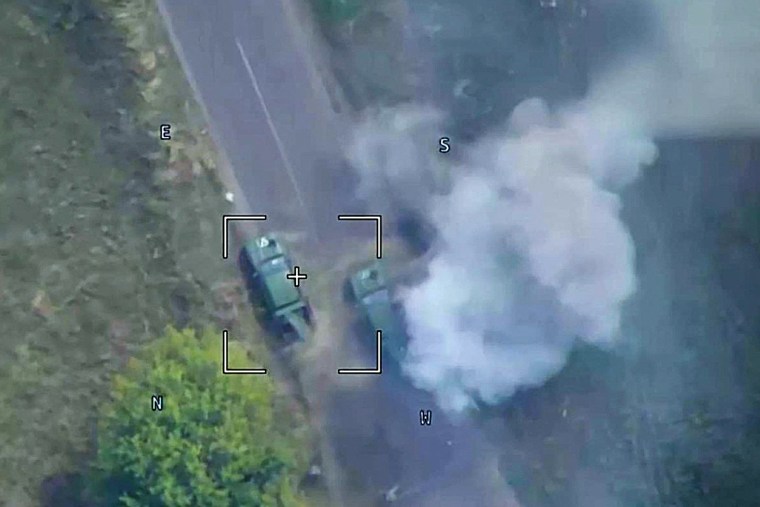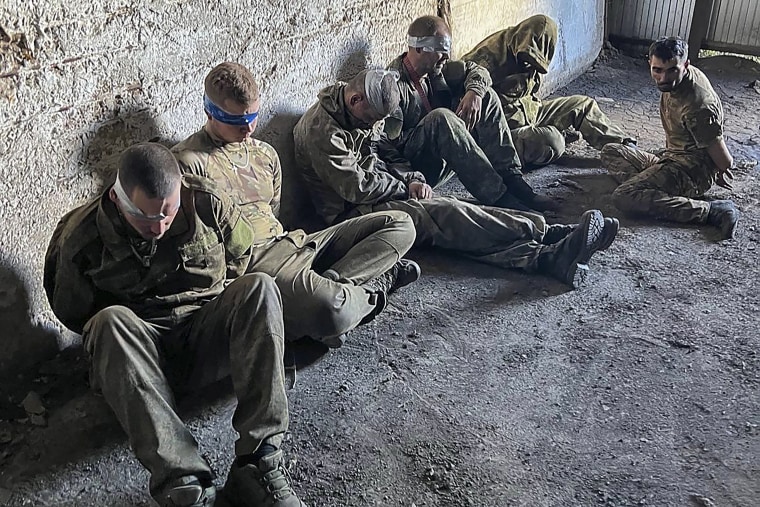The line of camo-clad men lying face down in the dirt track with their hands behind their backs is so long the camera has to zoom out and pan left.
The video, circulated widely on social media from an array of official and unofficial accounts, purportedly shows more than 100 Russian soldiers being taken prisoner by Ukrainian forces in Kursk this week.
The date or circumstances in which the footage was shot could not be independently verified. But it’s one of many emerging that are helping to paint a picture, from one side at least, of Ukraine’s stunning incursion into Russia.
The assault that turned the war on its head was made possible by surprise and secrecy — a buildup of troops and equipment that caught the Kremlin off guard — with its early promise shrouded in the fog of war and a vacuum of information left by tightlipped official sources.

But as Ukrainian forces push deeper into Russia, the operation has been amplified by a wave of visuals that have offered a glimpse of developments from the new battlefield: troops raising the Ukrainian flag over border villages, military vehicles rolling down Russian streets and scores of prisoners of war seemingly captured.
Through two and a half years of war, a parallel conflict has played out online. This latest round offers a rare glimpse into what a surprise attack looks like on a modern battlefield.
This has all been eaten up by a weary Ukrainian public in need of a morale boost as well as the legion of observers straining to track developments on the ground.
“The situation is very dynamic and there are a lot of variables and changes, so the images and videos only tell a certain part of the events,” said Emil Kastehelmi, a military analyst with the Finland-based Black Bird Group, which analyzes open source intelligence. “By geolocating images and videos and analyzing the material and the general situation in the direction, we can still say Ukraine holds the initiative and further gains are possible,” he told NBC News.
For the first five days following the Aug. 6 operation, Ukraine did not even acknowledge its troops were inside Russia. In contrast, Moscow’s defense ministry offered daily updates and shared videos of its scrambled response to try to project an image of control over the unraveling situation.
But then things changed. Ukraine, seemingly satisfied with the early results, acknowledged the operation. And videos started emerging on social media, many filmed by invading soldiers, showing damage and destruction in the Kursk region.
NBC News has been able to geolocate a number of these videos to form a clearer picture of the Ukrainian incursion and how it has unfolded.
A Russian border crossing near the key town of Sudzha, which Ukraine now says it fully controls, can be seen after its destruction sometime from Aug. 2 to Aug. 6, when the incursion began.
A video then emerged last Friday showing a convoy of burned-out military trucks, some bearing the “Z” symbol of the Kremlin’s war and appearing to contain bodies, alongside a highway in the border village of Oktyabrskoe. The video raised the ire of Russia’s influential military bloggers, who questioned why the trucks were moving in a convoy under Ukrainian fire.
“The Russian government has tried its best to conceal the extent of its failure in Kursk from the Russian people, but modern-day communications technology, above all social media and the internet, has made that impossible,” said Rajan Menon, director of the grand strategy program at Defense Priorities, a Washington-based think tank. “Not only is Putin unable to control events on the ground in Kursk, he can’t control what Russians see and hear. The official rendition is flatly contradicted by social media, photographs and bloggers.”
The first evidence then emerged on social media of Ukrainian soldiers sweeping through Russian border communities: the yellow-and-blue flag being raised in the settlement of Guevo in the southern part of the Sudzha district, and soldiers removing a Russian flag from an administration building in the village of Sverdlikovo, right on the border.
One video showed a Ukrainian soldier gleefully posing in front of a road sign northwest of Sudzha in the Kursk region and warning Russians that Ukrainians were approaching.
Another showed Ukrainian soldiers patrolling a residential street in military vehicles and on foot, with guns drawn, in a Kursk village.
Russia’s defense ministry has shared its own videos of what it said were Ukrainians captured in Kursk in recent days.
But such is Ukraine’s apparent confidence in its control over Sudzha that on Wednesday a Ukrainian TV correspondent filmed footage inside the town center as troops pulled down a Russian flag from a building. Foreign journalists soon followed.

And for the first time on Friday, several social media accounts of Ukraine’s military branches released edits of combat footage showing the first hours of the incursion, complete with dramatic music.
“Use of social media images of Ukrainian forces in Russia does seem to be an element in the overall Ukrainian strategy,” said Phillips O’Brien, a professor of strategic studies at the University of St. Andrews in Scotland. “They are undermining Putin’s standing by showing Ukrainian troops on the soil of Russia itself — moreover, in good morale, well equipped and moving pretty freely in daylight.”
A flood of videos this week on social media, like the one showing the men lying face down in the dirt, purport to show Ukrainian soldiers taking Russian prisoners of war. Many of the videos have been shared by “Hochu Zhit,” or “I want to live” in Russian, a government project launched by Ukraine’s military intelligence that aims to convince Russian soldiers to surrender.
These images are important for Ukraine to undermine the narrative that it is up against an unstoppable force, O’Brien said. “That large numbers of Russians are surrendering on the soil of Russia itself casts the Russian military in a very different light,” he added.






